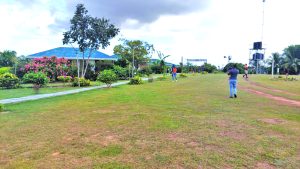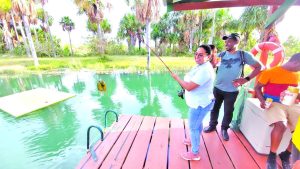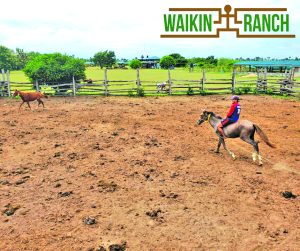By Andrew Carmichael
The Rupununi Savannah encompasses 5000 square miles of virtually untouched savannahs, swamplands and rain-forested mountains. In the middle of it in the North Rupununi and along the Kurupukari/Lethem Road is Waikin Ranch.
Sitting on 33,000 acres, much is which is savannah; the ranch is home to many of Guyana’s large animals including the Giant Anteater and several species of monkeys.
On any day, a visitor can see most of the 400 species of birds documented there.
Yes, that many different birds live there – of that number, two are endangered and one rare.
The ranch offers horseback riding, canoeing, fishing, bird watching and a few novelty activities.
Those who might not want to chance horseback riding can learn to drive a tractor, feed the pigs, sheep, or milk the cows, while sipping on juices made from fruits from the farm.
Operator of the ranch Victor Pires said one of the fun activities is fishing.
“We have a pound here stocked with Tambaqui – a lovely fish to catch on a rod; it fights very heavily. We have an excellent record with anteaters. Our guest would come and see anteaters at a 90 per cent success rate.”

How did it get started?
Victor Pires is the CEO at Caribbean Chemicals. He said his father was a major shareholder in Livestock Development Company (LIDCO) which went out of operation almost 30 years ago.
The company had 500,000 acres of land and when the company was closed, Pires was given 33,000 acres of land in lieu of his 18 per cent shares.
Though he believes what he received was less than one per cent of the assets of the company, Pires utilised the land to make money.
First, as an agriculturalist and owner of Caribbean Chemicals, Pires went straight into agriculture, producing fruits, vegetables and spices.
“We tried almost everything. That yellow watermelon was first planted here but we did not know how good it would do. So, before Georgetown knew about it, we had grown it up here.”
At one time, Waikin Ranch had 25 employees as both the fruits, vegetables and spices were making money. Now there are just 14 persons on the ranch, but the focus has shifted to tourism.
Shift to tourism
According to Pires, the Brazilian dollar dropped by 50 per cent against the US dollar.
“That immediately made every product in Guyana more expensive than a product from Brazil; so, Lethem started buying everything from Brazil,” Pires explained to this publication.
This forced Pires to go into tourism, which has been improving since the restrictions imposed as a result of the COVID-19 pandemic have been lifted.
The shift to tourism came in 2017.
The ranch boasts that at least 90 per cent of the food consumed by guests is grown on the ranch.
“All the vegetables, the fruits, the chicken, duck, pig, beef; so, you get everything farm fresh as they would say,” Pires proudly stated.
About 50 per cent of visitors are locals, with the rest being shared equally between North America and Europe.
Located 20 minutes from the town of Lethem by road, Waikin Ranch should be at the top of your “to-visit” list.
Pires added with the road from Georgetown to Lethem being improved, it is becoming easier for people to get to Waikin Ranch for day and overnight trips.




